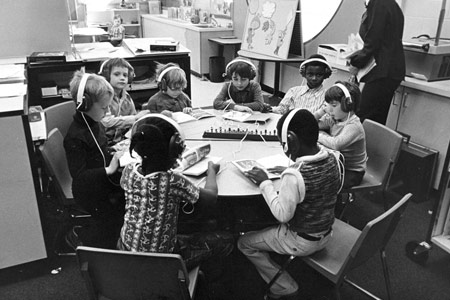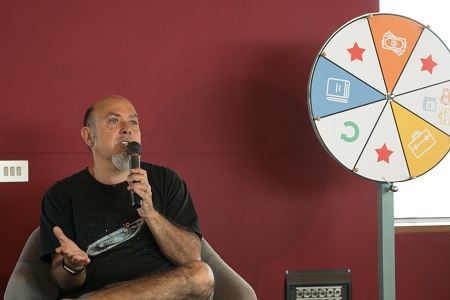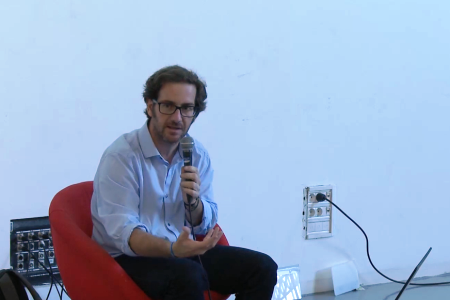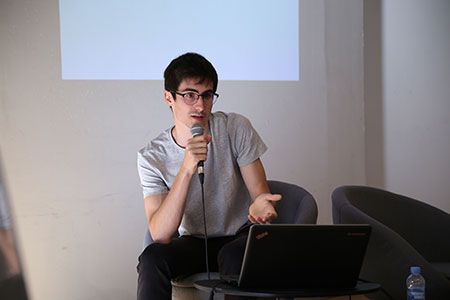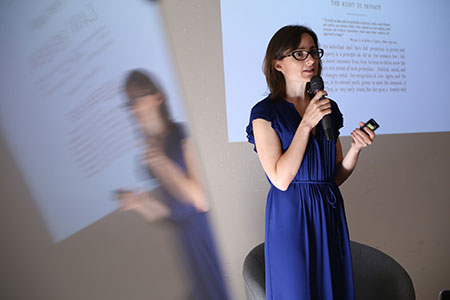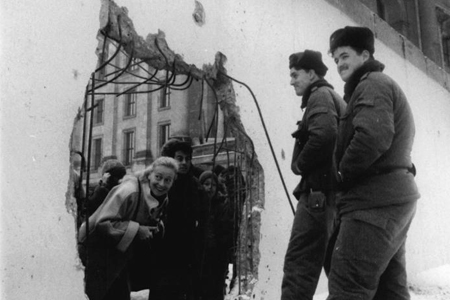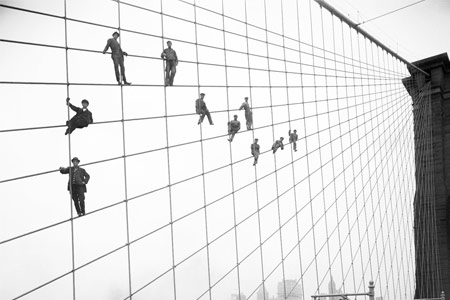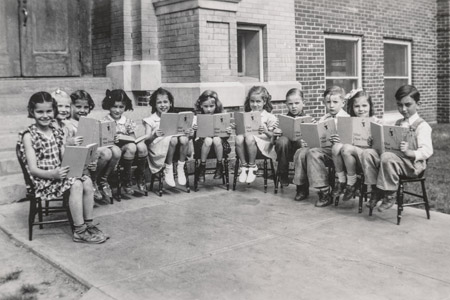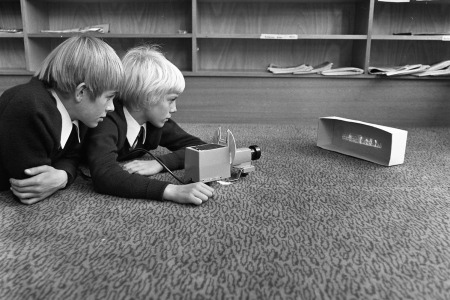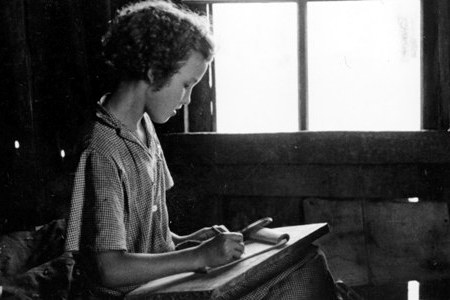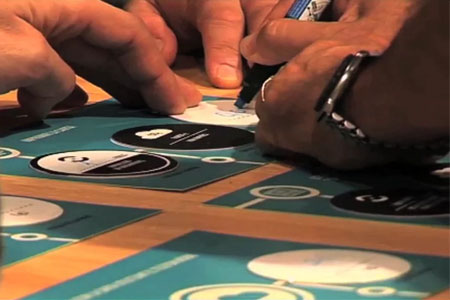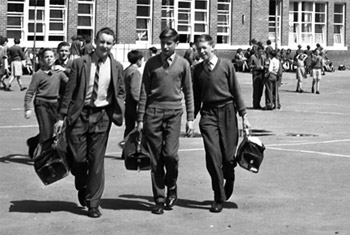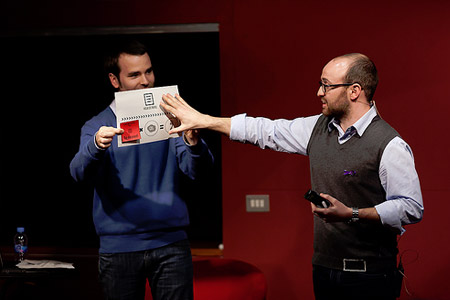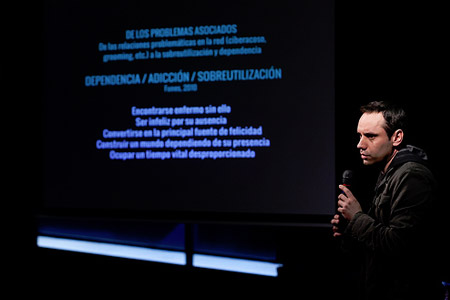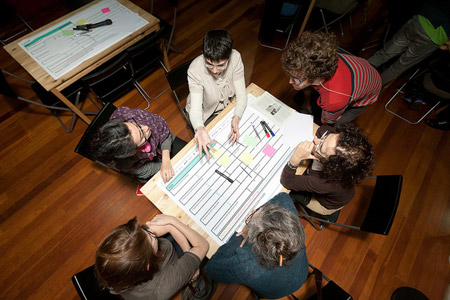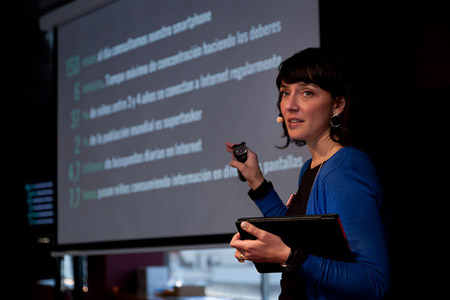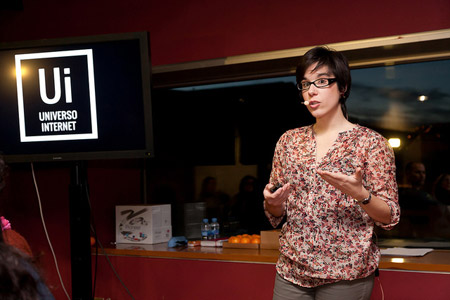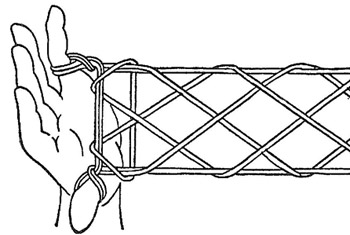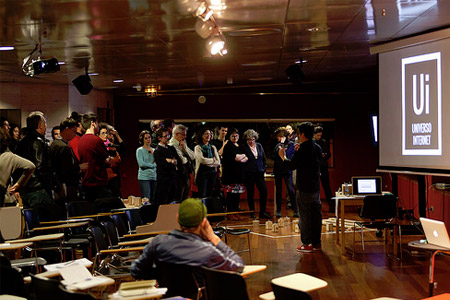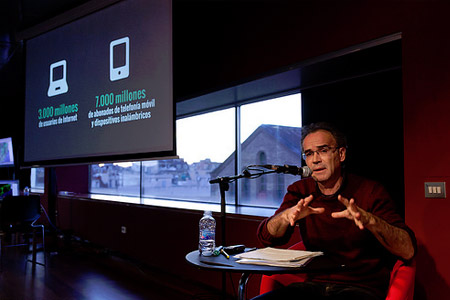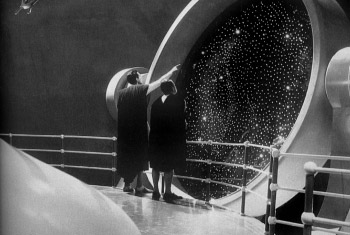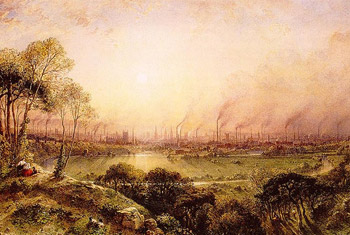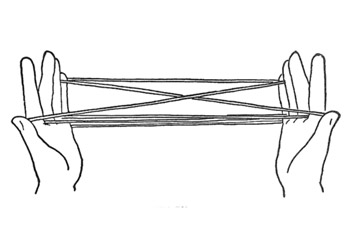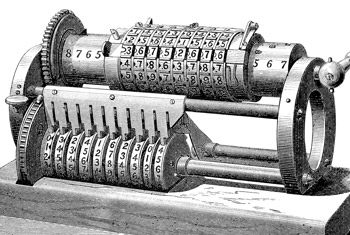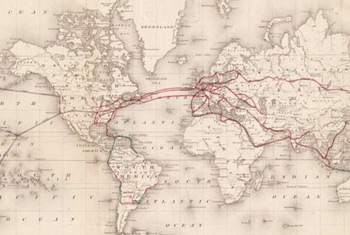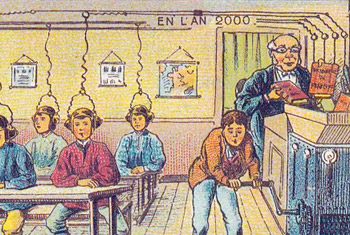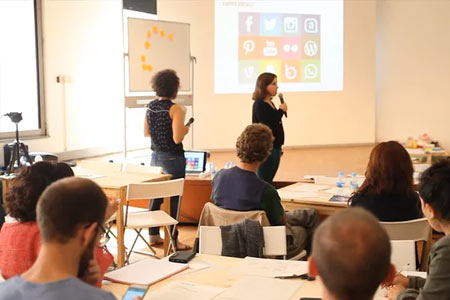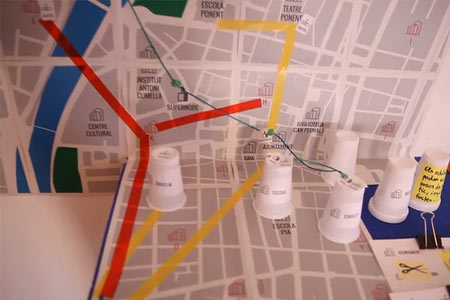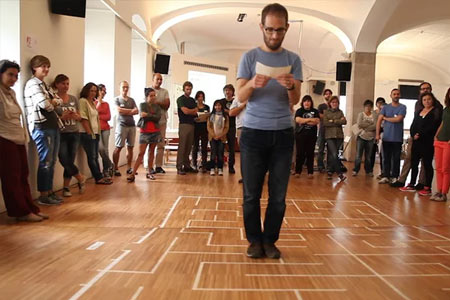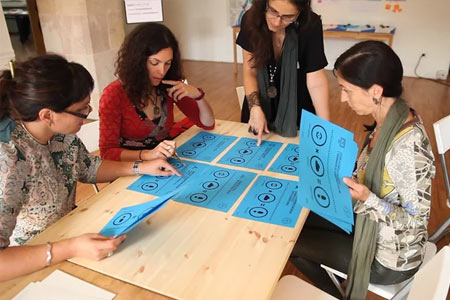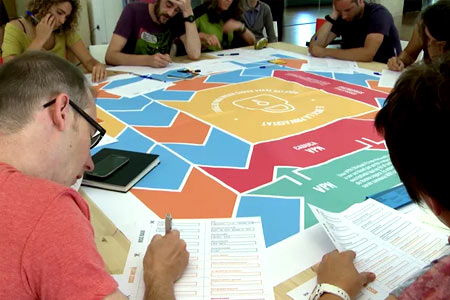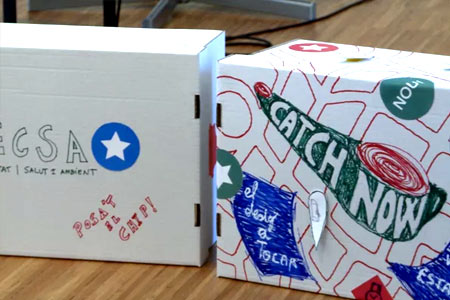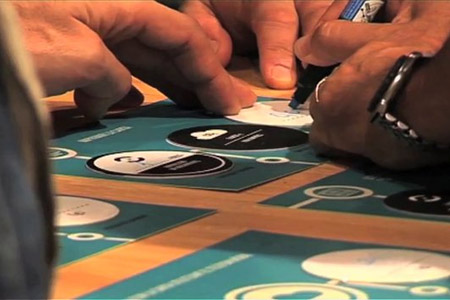Internet Universe
How does the network affect in our lives
Internet Universe is a project whose main objective is to offer critical and creative reflection on the set of technologies linked to the Internet, which is causing a transformation that is unprecedented in human history.
Learning and teaching with digital technologies
Júlia Coromina
When integrating ITCs into the classroom it is important to evaluate to what degree it enriches the relationship established between students, tasks and contents, and teacher.
David Casacuberta
Internet Universe: "Algorithmic injustice"
Big data and artificial intelligence allow us to automate decision-making about questions that humans have always made so far. The problem of using algorithms based on automatic learning is that if these systems draw on databases that contain our society’s racist, xenophobic and sexist ...
Thinking, Building and Inhabiting the Web
Lecture by Carlos Magro
Talk by Carlos Magro, expert in innovation and digital strategy in the education sector.
Marilín Gonzalo
Privacy in a digital setting
We are living in a time of growing, extreme datification, when a digital footprint is inevitable. Based on the genealogy of the concept of privacy, which existed prior to the Internet, we will consider what incidents like Edward Snowden’s leaks show. Do we still have the right to privacy ...
Freedom and Privacy on the Net
Marilín Gonzalo
The exponential growth and control of data is under debate, between the private interests of companies and the rights of users.
Tips for Teaching Online Privacy
Liliana Arroyo
Accompaniment, using the internet as a family, and dialogue are necessary strategies to teach children how to manage their online identity.
Digital Natives: From the Myth to the Reality
Ferran Adell
Today’s students have been in contact with technologies since their early childhood; they are what are known as digital natives. They have greater ease in understanding the basic functioning of devices and programming, but this does not mean that they have a better understanding of […]
Young People, the Internet, and Privacy: The Challenges of Identity in the Digital Era
Liliana Arroyo
Teenagers use the internet as a space for leisure, interaction, and construction of personal identity. They rarely stop to wonder about the source and destination of the information that flows through this infinite and seeming volatile network. Online activity opens up […]
The Internet Universe of Teenagers
Quima Farré
The Internet Universe Educational Briefcase is a new pedagogical tool for high schools developed by CCCB Education and CCCB Lab. It is designed to take knowledge and reflections about the impact of the Internet on our lives into the classroom. In the lead-up to [...]
Internet Universe. The materialisation of the cloud and the ecological consequences of the Internet
Lecture by Marcus Hurst
Within a context of global ecological crisis, what is the environmental impact of the Internet? What is its material dimension? Can the Internet collaborate in creating a more sustainable world?
Internet Universe. The ecological footprint of everyday use of the Internet
Workshop with Jordi Oliver
This workshop explored, in a practical and very graphic way, what the ecological footprint is of everyday actions that are carried out via the Internet.
Internet Universe. Social networks: risks and potentials for children and teenagers
Lecture by Jordi Bernabeu
Why are the social networks so attractive to children and teenagers? What do they provide them with? How do they affect, in positive and negative terms, their interpersonal relations and the creation of their own identity? Have the social networks changed the concept of privacy? In what sense? Where is the boundary between the real and the virtual world? How can we detect or prevent addiction? Is it possible to make good use of the social networks? Social networks can reinforce a series of positive values such as cooperation and teamwork and favour the development of collective intelligence.
Internet Universe. The social networks as a tool for the construction of an aware and participative citizen
Workshop with Isidre Plaza and Senén Roy
Internet is a network of networks; it cannot be understood without its social dimension. Technology must help the pupils of this century to extract all the collective intelligence that can help them to develop in a global world. This workshop showed, in a practical way, how the social networks ...
Internet Universe. Does the Internet make us more superficial or smarter?
Lecture by Cristina Sáez
The use of the Internet modifies our brain thanks to the organ’s plasticity. But what are its effects on cognitive processes? What influence does it have on our capacity for concentration, critical thinking, memory, mental agility and reasoning? Debate currently rages regarding what ...
Internet Universe. The logic of programming
Workshop with Irene Lapuente
The point of origin of good programming is to define what the problem is to be resolved, and from there, to decompose the process in order to get to it and construct all the modules necessary to make it possible. How can we apply this logic to everyday life? And to the planning of academic ...
Learning on the Net (2). Between preventive and educational action
Jordi Bernabeu
There is some cause for concern about the use of the Web 2.0 environment by teenagers and young people. Even though its potential and its advantages are beyond doubt, certain cases over the last few years have set alarm [...]
Internet Universe. Building the network
Workshop with Efraín Foglia
In this workshop we built a simulated telecommunications network that allowed us to discover the real structure of the Internet. Using this methodology we can understand what is required in order to be connected to the Network and what implications are involved on a social, economic and political ...
Internet Universe. Internet: a history under construction
Lecture by Juan Insua
The History of the Internet is a collective creation that is still under construction, with its origins in the hands of the military. Today it has come to form part of the everyday life of many people. What is the real scope of the digital revolution and how does it affect all spheres of human ...
How Polluting is the Internet?
Marcus Hurst
There’s a big difference between sending a million emails and sending a million letters. Choices like buying an e-book instead of a print book, watching a film online rather than a DVD, or organising a work meeting on Skype rather than flying from Barcelona to London [...]
Learning on the Net (1) Uses and dilemmas.
Jordi Bernabeu
Illustration from String Figures and How to Make Them, by Caroline Furness Jayne (1906). Source: Wikipedia Everything that we think of as the Internet 2.0 –social media, basically– has brought about a revolution in our practices of interaction, communication, research and production ...
The Technorevolution in the Classroom
Cristina Sáez
Education experts warn that we have an anachronistic educational system, created 300 years ago to meet the needs of a period that revolved around the industrial production of objects. They advocate the need for a new educational approach based [...]
The Geopolitics of the Internet
Marcus Hurst
The Internet is not an abstract entity that moves through the air. Rather, it is based on a mammoth physical infrastructure that spreads throughout the globe. The laying of the cables that make the Internet a global network raise geopolitical issues similar to those that are at stake in [...]
The Internet Universe. Shallower or Smarter?
Cristina Sáez
À l’école. Inside the postcard series: France en l’an 2000. XXIème siècle. (Atrib. a J.M.Côté, 1901). Soucer: Wikimedia Commons In 2008, American technologist Nicholas Carr published an article in which he argued that the Internet was eroding ...
Privacy Dilemmas
Educational Briefcase. Internet Universe #6
This educational unit, “Privacy dilemmas”, takes the form of a board game. Students, in teams, have to answer questions and situations associated with how privacy is managed in the digital world. The goal is to give them tools to become more aware of what goes on with our data and ...
